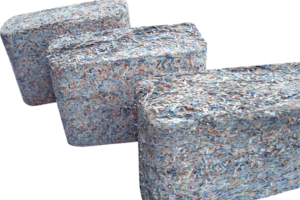

The briquette press is used for many materials
There are two key challenges when it comes to collecting waste and residual materials. One is the enormous volume and the associated space requirements. Secondly, loose residual materials are difficult to process and transport. The briquette presses from Hunkeler Systeme solve both problems at once. Learn more about the advantages of briquetting in this article
What are the applications of briquette presses?
Presses for briquetting from Hunkeler Systeme AG are primarily designed for use in two areas. First, these are professional paper, cardboard converters and financial institutions. They depend on efficient and versatile solutions that also work around the clock.
These operations often process large quantities of dust per day. The challenge is to deliver efficient equipment with high precision. Another important factor is the reduction of manual labor. For example, briquette presses are designed to operate fully automatically until the materials are discharged.
Then there is the industry. It, too, benefits from individual and intelligent disposal technology. There, the systems are integrated directly into the production areas. After the waste products have been extracted or otherwise fed in, compression takes place in the press.
How are briquette presses integrated?
The presses from Hunkeler Systeme AG can be integrated into fully automated production processes. Alternatively, they can be used as stand-alone systems. They are suitable for combination with production lines for paper and cardboard, metal, all forms of plastic or even wood chips.
The materials can usually be fed in via conveyor belts. It is also possible to integrate them into the production process in combination with suction technology from Hunkeler Systeme. The output from the press is fully automatic. The uniform briquettes are ready for further transport.
Modern briquette presses operate largely independently. This enables fully automatic operation around the clock at low running costs.
Why is the compaction of residual materials with a briquette press useful?
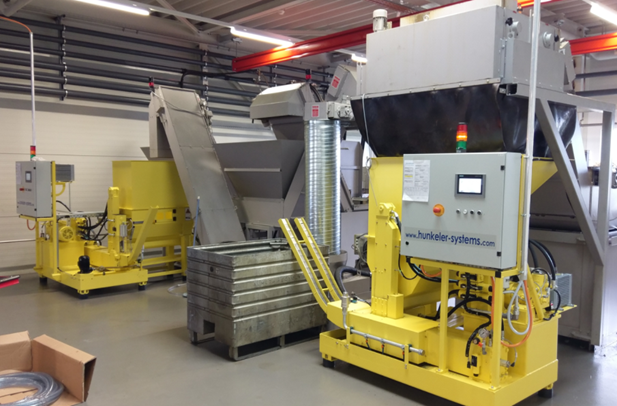
Sorting is only the first step in the recycling process. Practical concepts are needed for transporting and storing the separated materials. This is where our briquette presses are the right solution.
You integrate the hydraulic chamber briquette presses directly downstream of the production plant. The recyclables enter the briquette press, where their compaction takes place. The pressing process reduces the volume of the raw materials. This reduces the effort and costs for further handling.
When briquetting with Hunkeler Systeme presses, the volume of metal, for example, is reduced by a factor of 40. Throughput rates of up to 1,500 kg per hour are possible when compacting paper. When pressing raw materials made of metal, throughputs of even 4,800 kg per hour can be realized.
Briquette presses for any task
We offer a wide range of presses of various classes. Compact models are suitable for small quantities of recyclables. They are designed for volumes of up to 0.3 cubic meters and 40 kilograms per hour. The larger systems, on the other hand, process up to 2.3 cubic meters of material per hour. In between, we offer many other models.
You can also influence the size of the ejected briquettes through the model and the power of the press. Our briquette presses produce both rectangular and octagonal briquettes. The size of the briquettes ranges from 120 by 45 by 20 millimeters to 125 by 70 by 80 millimeters.
What materials process briquette presses?
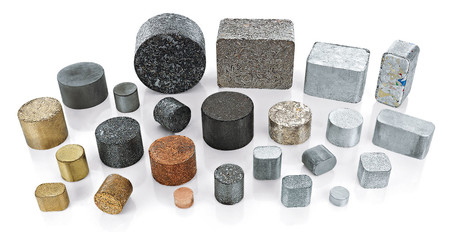
Briquetting with briquette presses has the great advantage that it is suitable for a wide variety of materials. Among them are the following:
- aluminium
- banknotes
- grinding sludge
- metals
- paper
- copper
- dust
- wood
- biomass
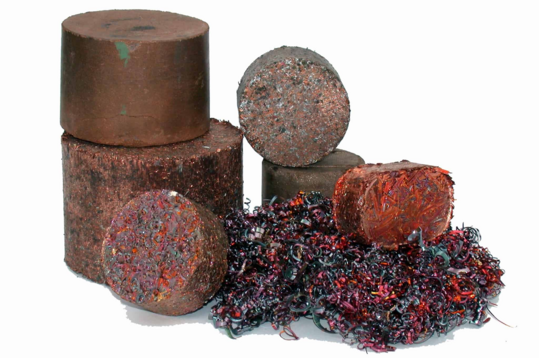
In principle, this process is suitable for all materials as long as the particles and chips are not larger than 50 millimeters. For materials with residual moisture (such as wood), the moisture content should be less than 15 percent. In the optimal case, it is less than 13 percent.
Moreover, briquetting is useful even for smaller quantities of raw materials. Compact briquette presses are a particularly economical solution. Space-saving and easy storage allows you to collect raw materials until sufficient quantities are available for further processing.
Briquette presses for banknotes from Hunkeler Systeme
Our presses can be adapted to specific tasks. One example is the briquetting of destroyed banknotes. Here, shredding takes place according to strict rules. A briquette press is connected which forms uniform briquettes from the shredded fragments.
These, in turn, are a valuable raw material that can be fed into various paper manufacturing or cement processing processes. Among other things, recycling in your own plant is also possible. In this way, our briquette presses help to create a closed raw material cycle.
Processing grinding sludge with briquette presses from Hunkeler
Grinding sludge is one of the unpleasant residues in metal processing. It is a mixture of small metal chips and lubricants. The lubricants are used during grinding and drilling operations and form a bond with the metallic grinding residues. These and other problematic residues are expensive to dispose of.
The solution for metalworking production plants are Hunkeler briquette presses for grinding sludge. The grinding sludge can be fed fully automatically via conveyor technology into the hydraulic slide press with a fixed pressing chamber. The Hunkeler presses for grinding sludge operate fully automatically.
When disposing of grinding sludge that has not been briquetted, the cooling lubricants in particular cause high costs. The advantage of pressing grinding sludge is that the end product is uncomplicated to process. On the one hand, the volume decreases significantly. On the other hand, the pressing process reduces the residual moisture to a minimum. A positive side effect is the recovery of expensive coolants. These can be returned to the production process.
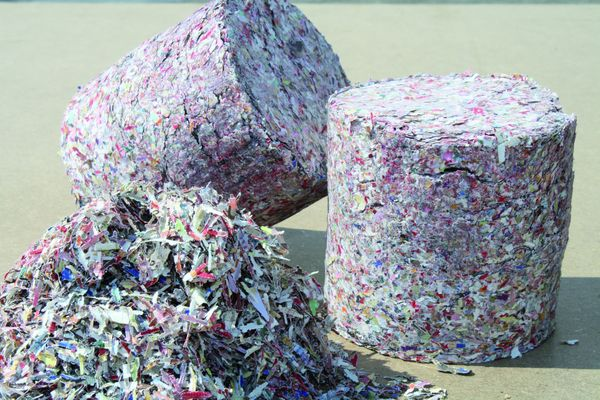
Pressing paper and cardboard dust into briquettes – with technology from Hunkeler Systeme
One raw material that is produced particularly frequently is paper and cardboard dust. Without compression, the material takes up a lot of space, fills a container very quickly, and is problematic to handle.
The presses from Hunkeler Systeme can handle all forms of paper and cardboard residue. This ranges from cuttings to shreds to fine dust. One advantage is that the briquette presses for paper and cardboard dust are particularly compact and therefore space-saving.
How does a briquette press help clean and recover recyclables?
On the one hand, a press helps you to clean the residual materials that are produced. On the other hand, the pressing process also makes it possible to recover these materials. Sometimes these are valuable raw materials. In some cases, they can also be recycled.
This is particularly often the case with residual materials that are mixed with liquids. The pressing process effectively and often almost completely removes liquid substances from the valuable materials to be pressed. It is then possible to further process both residual materials separately.
Examples from practice show how effective the briquette presses from Hunkeler Systeme are in this task. In metal processing companies, these systems are used for the recycling of chips. Since these originate from the drilling process, the chips are contaminated with cooling lubricant. The briquette press, under a pressure of about three tons, removes the lubricant almost completely.
This has two elementary advantages. First, the aluminum is now cleaned. It is therefore ready for recycling. It can possibly be returned to production in the company’s own plant. Secondly, the expensive and possibly toxic cooling lubricant is recovered.
The cooling lubricant is thus also returned to the process cycle after cleaning. This significantly reduces costs in production. At the same time, more environmentally friendly production is established.
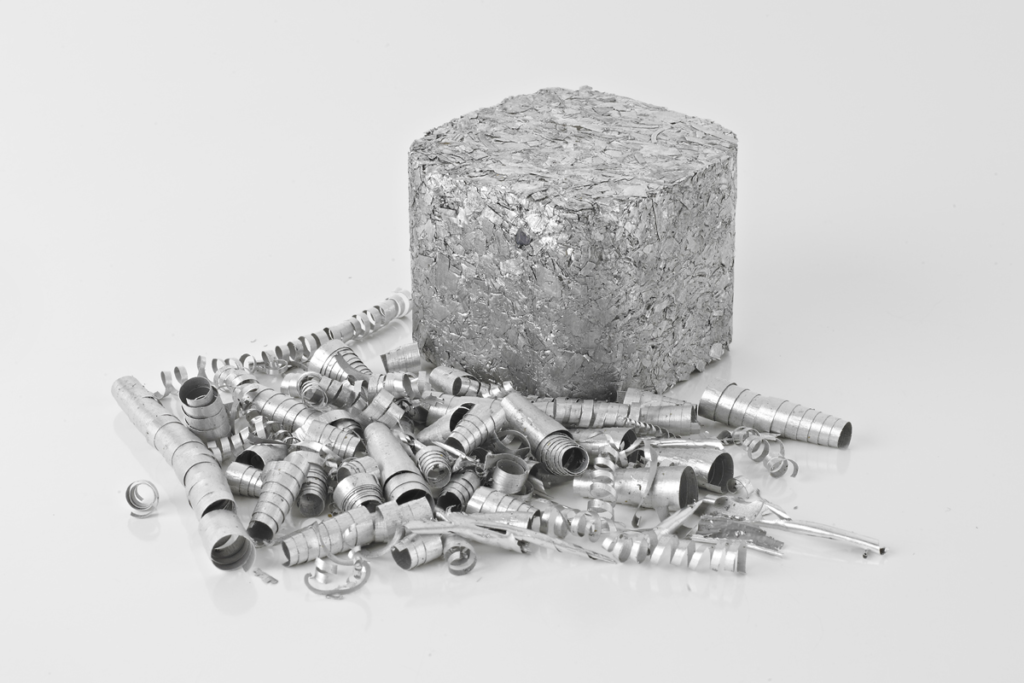
What are the advantages of a briquette press?
Briquetting the recyclables has numerous advantages. First, this process finishes the separation and processing. Then the raw material is available in a pure and standardized format for further use. This can be returned to production, sold as raw material or recycled.
The machines always form identical briquettes. This facilitates handling. The briquettes are stackable and are easy to transport thanks to their shape. Briquettes made from valuable raw materials or materials that are interesting for recyclers can also be sold easily.
Metals, for example, can be melted down directly in many cases. In this way, you create a closed raw material cycle through compression. This is a sustainable and environmentally friendly orientation for your company. At the same time, you reduce costs.
The presses from Hunkeler Systeme are also particularly compact. This allows space-saving integration into your company. At the same time, the systems are designed for low maintenance costs and a long service life. Automatic operation around the clock is possible without any problems. Thus, the presses from Hunkeler meet the high requirements of industrial companies.
These are some of the key advantages of Hunkeler Systeme briquette presses:
- reduction of volume
- simplification of transport and storage due to standard sizes
- reduced logistic effort
- minimization of disposal costs
- recovery of valuable raw materials for sale or recycling
- energy-efficient operation
- compact design
- fully automatic operation in 24/7 mode possible
- low operating costs
- low maintenance requirements
- long-life presses
Energy-efficient and economical: the briquetting technology of tomorrow
Most companies today attach great importance to economical operation. This is important simply because of rising operating costs. Added to this is the green image. Sustainable and ecological management has therefore become a central guiding principle.
With the briquetting technology of Hunkeler Systeme AG, you can implement these goals optimally. Recycling, closed raw material cycles and separation of residual materials are important components of a sustainable economy.
Our briquette presses, for example, only work when necessary. A pre-compressor compresses the material fed in and collects it until there is sufficient raw material for a full briquette. Only then does the actual hydraulic pressing process take place. As a result, the system works very economically and only consumes energy when it is really necessary. This reduces your operating costs.
Individual solutions for briquetting from Hunkeler Systeme AG
We manufacture powerful and reliable presses. These enable high compression rates thanks to hydraulics. We supply not only standard systems, but also individual solutions through tailor-made briquetting systems. They are precisely adapted to the requirements of our customers.
Part of our service is to analyze the situation on site with you. According to this analysis we plan and realize your new plant. We accompany you through all the phases – from planning to installation and commissioning. Of course, we are also available for the maintenance of the briquetting presses.
How to find the ideal briquetting system
When choosing a system for briquetting, there are numerous points to consider. These include the required capacity, the material to be processed or the space requirements. We at Hunkeler Systeme therefore advise you individually and personally. In this way, we work together with our customers to find the right solution for briquetting in each case.
Our service therefore includes a test pressing. Here, you send us the material you are processing. We carry out a pressing test. This test run provides us with valuable information. It shows whether the material can be pressed in this form. It may be necessary to crush it beforehand. We also determine the briquette density and the degree of compaction.
Your presence is very welcome during the test pressing. In this way, you can see the final result for yourself before buying a plant.
Are you looking for modern briquette presses for your company? Then contact us now. We will realize your project according to your ideas.
